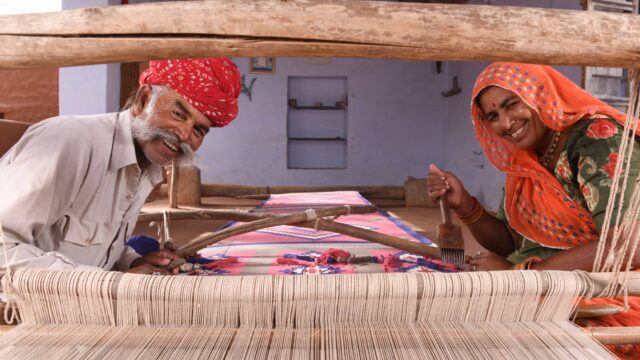Ramesh Prajapat was just 10 years old when his father Kishanlal, a noted durrie maker, lost his eyesight. Hardships in the family left Ramesh with no choice but to drop out of school and start working as a tile installer and mason. He was just 15 then.
Ramesh belongs to the carpet weaving community of Salawas near Jodhpur in Rajasthan. The iconic carpet or durrie (in local parlance) is world-famous for its simple yet intricate motifs, earthy colours and organic materials.

Many asked Ramesh to get them a durrie soon after they became aware of his roots. For the first few years though, he procured carpets from local artisans. Noticing rising demand, he decided to quit masonry and turn to his ancestral craft full-time. His mother Leela Devi had already taught him to weave by this point.

Malaram, a veteran artisan, is proud to be a part of this traditional craft. However, he is worried about its future. He feels that the increase in the demand for quality work is a great improvement but adds that a steady supply of cotton yarn at a subsidised price and direct linkage to the market bypassing middlemen and traders can work wonders. It can also bring back thousands of artisans, who migrated to other professions due to various reasons.


Normally, depending upon the intricacy of the design, it would take two artisans to work for a week or more to make a carpet. With the cost of thread being ₹600 or more per kilogram, and a minimum of 150 grams of thread to weave one square foot of carpet, a sale can fetch anything between ₹205-300 per square foot of the finished product, sometimes even more, depending on the detail of the work and carpet size.



Malaram trained his granddaughter in the art of weaving and wanted her to pursue the craft so that it would stay alive, just as Ramesh had taught weaving to his brother Parasmal and the rest of the family members.
Both Malaram and Ramesh echo each other when speaking of the need for instituting an association, organisation or society for durrie artisans, such that it can ensure a steady supply of subsidised raw material along with various governmental beneficiary schemes.


Interestingly, local artisans in Salawas have also diversified their product range from conventional carpets to table mats, coasters, bags etc. These changes trigger demand and generate a new customer base. Even students from many reputed art and fashion institutes take an active interest in this craft, such as when they come and live with the artisans to learn the craft of weaving.

A few artisans have started homestays in their humble mud houses, offering tasty local food as an additional draw. It is a lifetime experience for city dwellers to live with these artisans and learn more about the craft while experiencing the taste of true spartan life.
To make their homestays comfortable for the urban dweller, basic modern amenities like western toilets and air coolers have been added. Weekend trips to these spots offer an ideal combination of rejuvenation for tired nerves, becoming familiar with one’s heritage and making a small contribution to the revival of an artform that is representative of the rich tradition of Rajasthani folk art.

Info Box
Interlocked weaving makes them reversible while the Colour-fast natural dyed yarn is the reason they are completely washable to suit the practical need of the modern home. Woven using cotton or silk yarn, or goat or camel hair, the warp and weft are cotton yarn.
Visit http://salawasdurry.com/ for online orders and participate in a workshop even as you visit them and want your picks shipped to friends, family and loved ones.




